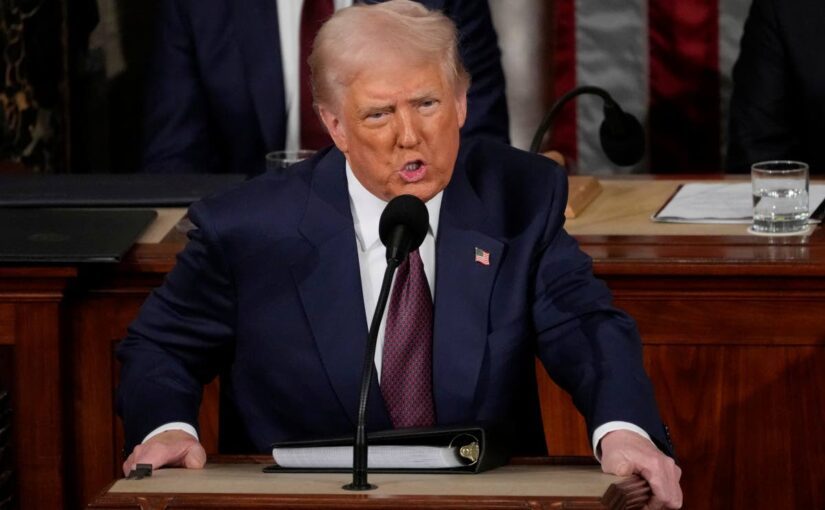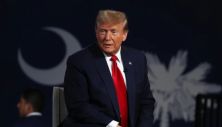by Beiyi SEOW and Becca MILFELDUS President Donald Trump announced Monday steep tariffs on imports from countries buying Venezuelan oil and gas, a...
Vous n'êtes pas connecté
- English
- Français
- عربي
- Español
- Deutsch
- Português
- русский язык
- Català
- Italiano
- Nederlands, Vlaams
- Norsk
- فارسی
- বাংলা
- اردو
- Azərbaycan dili
- Bahasa Indonesia
- Հայերեն
- Ελληνικά
- Bosanski jezik
- українська мова
- Íslenska
- Türkmen, Түркмен
- Türkçe
- Shqip
- Eesti keel
- magyar
- Қазақ тілі
- Kalaallisut ; kalaallit oqaasii
- Lietuvių kalba
- Latviešu valoda
- македонски јазик
- Монгол
- Bahasa Melayu ; بهاس ملايو
- ဗမာစာ
- Slovenščina
- тоҷикӣ ; toğikī ; تاجیکی
- ไทย
- O'zbek ; Ўзбек ; أۇزبېك
- Tiếng Việt
- ភាសាខ្មែរ
- རྫོང་ཁ
- Soomaaliga ; af Soomaali
Rubriques :
 Maroc - EURASIAREVIEW.COM - A la une - 09/Jan 00:02
Maroc - EURASIAREVIEW.COM - A la une - 09/Jan 00:02
How Trump Threatens The World Trading System – OpEd
By Robert Staiger If the United States wanted to break the world trading system it could not have done better than to re-elect Donald Trump to the US Presidency. Not that Trump is alone among recent US presidents in his disregard for the current system of global trade rules. The Biden administration maintained and even extended a number of high-profile trade policy initiatives from the first Trump administration and paid little heed to how these policies squared with the rules of the World Trade Organization (WTO). And the unwillingness of the first Trump Administration to fill vacancies created by the expiring terms of WTO judges continued a practice adopted by the Obama Administration. But Trump’s words and actions have made it uniquely clear that his vision for a world trading system is antithetical to the rules-based multilateral global trade order that the United States helped to create 75 years ago. The current global trading system was established through the General Agreement on Tariffs and Trade (GATT), the precursor to the WTO. GATT’s rules-based global trade order was built on the twin pillars of non-discrimination and reciprocity. The ‘most-favoured-nation’ (MFN) rule of non-discrimination ensures that exports of the same product originating from any country enjoy equal tariff treatment in a given destination market. Reciprocity means that tariff bargains aim to balance the changes in import and export volumes that each country experiences as a result of the negotiations. These pillars created a system that constrains large trading countries’ ability to dominate negotiations. The MFN principle dilutes the ability of large countries to extract disproportionate advantages from smaller bargaining partners by ensuring that any gains are also shared by third-country exporters. Reciprocity further neutralises the exercise of power in tariff bargains because it establishes an expectation of balanced terms for the bargain. This system of rules encouraged smaller countries to invest in globalisation without fear of exploitation at the bargaining table, and the more inclusive globalisation that resulted benefited large countries as well. By discouraging the bluff and bluster accompanying the exercise of power in negotiations, the rules delivered a streamlined method for tariff bargaining that dramatically reduced trade barriers over the latter half of the twentieth century, helping to usher in decades of trade growth and poverty reduction. Importantly, these rules created a ‘member-driven’ system, where countries have the flexibility to decide what trade policies are right for them, provided they do not aim to shift their policies’ costs onto trading partners. Eliminating these cost-shifting incentives is the primary goal of the rules, and a world trading system built on MFN and reciprocity is well-designed to help governments achieve this goal. As trading partners often bear costs when a country imposes tariffs, achieving this goal naturally leads to lower tariffs around the world. But how much lower is a matter for each country to determine for itself through voluntary rules-based negotiation. Built-in flexibilities within the system allow countries to rethink their preferred level of trade openness if they so desire. As such, being a free trader is not a prerequisite for supporting the rules-based global trade order administered by the GATT and WTO. And a country does not have to escape from these rules in order to rethink its commitment to a level of openness. Rather, the rules provide a ready-made and orderly avenue for the country to do just that while maintaining a measure of predictability and stability in trading relations that is itself an important benefit of the rules-based system. The incoming Trump administration plans to take a sledgehammer to the pillars of the rules-based global trade order. Under the first Trump administration, then commerce secretary Wilbur Ross outlined an alternative trading system wherein countries with the lowest tariffs would match the tariffs of those with the highest, country by country and product by product, automatically adjusting as other countries lower their barriers. Under this system, MFN would be abandoned, as exporters from a high-tariff country would face high tariffs in a given market while exporters of the same good from a low-tariff country would face low tariffs in that market. This system would also introduce an unprecedented notion of reciprocity — matching tariff levels across countries rather than negotiated tariff changes — that is antithetical to the member-driven logic of the WTO. In short, the vision for a global trade order articulated under the first Trump administration would replace the rules-based multilateral trading system with something more like a power-based system for tariff bargaining where large countries are no longer constrained by the rules of behaviour that have shaped the system for the past 75 years. President-elect Trump’s recent statements reflect this vision of power-based tariff bargaining and broaden it to include the use of tariffs as bargaining chips for a host of settings beyond traditional tariff bargaining. These include non-tariff issues ranging from the regulation of immigration to the production of fentanyl precursors to the role of the US dollar in the global economy. There are also indications that Trump will seize the opportunity to engage in bargaining with domestic interests in the United States over exceptions to his tariff policies, all of which fits with his view that tariffs are a bargaining chip to extract concessions from others. The rules-based system administered by the WTO is far from perfect. But its creation 75 years ago was built on lessons learned from earlier failed attempts at power-based trade bargaining and there is good reason to think that the core features of this system remain valuable today relative to a power-based alternative. Viewed in this light, the incoming Trump administration’s evident intent to tear down the rules-based multilateral trading system and replace it with a power-based system will likely end in disappointment — if not disaster. About the author: Robert Staiger is Roth Family Distinguished Professor in the Arts and Sciences and Professor of Economics, Dartmouth College. He is also Research Associate at the National Bureau of Economic Research. Source: This article was published by East Asia Forum
Articles similaires
Trump slaps tariff on countries importing gas/oil from Venezuela
SINCE US President Trump announced a 25 per cent import tariff on countries buying oil and gas from Venezuela on March 24, the big question in TT is,...
Trump threatens larger tariffs if Europe works with Canada
President Trump has threatened to impose larger tariffs on the European Union and Canada if they team up against the US, as an escalating trade war...
Brussels Hold’em: European Cards Against Trumpian Coercion – Analysis
By Tobias Gehrke At the card table “The European Union”, posted Donald Trump on his Truth Social account on March 13th, is “one of the...
Trump Slaps Tariff On All Countries That Buy Oil From Venezuela
President Donald Trump announced on Monday that any nation that purchases oil from Venezuela would be hit with a 25% tariff by the United States....
U.S. President Allowed for Tariff Relief for “Many Countries”
U.S. President Donald Trump stated that he may exempt certain countries from reciprocal tariffs if he deems it necessary. CNN quoted his...
Unintended Consequences: How Trump’s Tariffs Are Reshaping The World Economy – OpEd
Donald Trump’s tariff policy represents a significant shift in international economic development, breaking the boundaries of traditional global...
Trump to impose 25-percent tariffs on countries that buy oil from Venezuela | Donald Trump News
US President Donald Trump has announced that any country that purchases oil or gas from Venezuela will face a 25-percent tariff in its trade with the...
Trump adds 25% tariff on foreign-made autos, light trucks
by Jacob Fischler, Daily Montanan March 26, 2025 President Donald Trump signed an executive order Wednesday to impose a 25% tariff on imported...
Europe’s Best Bet Is To Increasingly Rely On Itself For Its Own Security And Defense – Analysis
Europe’s best bet is to increasingly rely on itself for its own security and defence. By Emiliano Alessandri and Domenec Ruiz-Devesa Europe...
Les derniers communiqués
-
Adobe Brings Conversational AI to Trillions of PDFs with the New AI Assistant in Reader and Acrobat
Adobe - 21/02/2024
-
Laura Frigenti takes the Helm as Chief Executive Officer of the Global Partnership for Education
Global Partnership for Education - 05/12/2022




